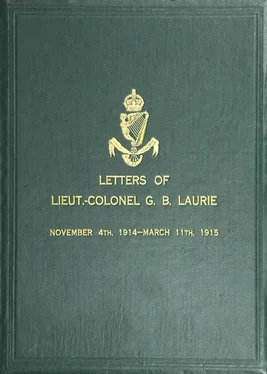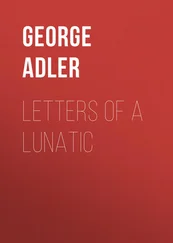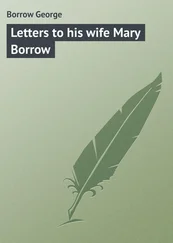George Laurie - Letters of Lt.-Col. George Brenton Laurie
Здесь есть возможность читать онлайн «George Laurie - Letters of Lt.-Col. George Brenton Laurie» весь текст электронной книги совершенно бесплатно (целиком полную версию без сокращений). В некоторых случаях можно слушать аудио, скачать через торрент в формате fb2 и присутствует краткое содержание. Город: Aldershot, Год выпуска: 1921, Издательство: Gale & Polden, Ltd, Жанр: Биографии и Мемуары, prose_military, на английском языке. Описание произведения, (предисловие) а так же отзывы посетителей доступны на портале библиотеки ЛибКат.
- Название:Letters of Lt.-Col. George Brenton Laurie
- Автор:
- Издательство:Gale & Polden, Ltd
- Жанр:
- Год:1921
- Город:Aldershot
- ISBN:нет данных
- Рейтинг книги:5 / 5. Голосов: 1
-
Избранное:Добавить в избранное
- Отзывы:
-
Ваша оценка:
- 100
- 1
- 2
- 3
- 4
- 5
Letters of Lt.-Col. George Brenton Laurie: краткое содержание, описание и аннотация
Предлагаем к чтению аннотацию, описание, краткое содержание или предисловие (зависит от того, что написал сам автор книги «Letters of Lt.-Col. George Brenton Laurie»). Если вы не нашли необходимую информацию о книге — напишите в комментариях, мы постараемся отыскать её.
Letters of Lt.-Col. George Brenton Laurie — читать онлайн бесплатно полную книгу (весь текст) целиком
Ниже представлен текст книги, разбитый по страницам. Система сохранения места последней прочитанной страницы, позволяет с удобством читать онлайн бесплатно книгу «Letters of Lt.-Col. George Brenton Laurie», без необходимости каждый раз заново искать на чём Вы остановились. Поставьте закладку, и сможете в любой момент перейти на страницу, на которой закончили чтение.
Интервал:
Закладка:
Percy.
“AFTERWARDS.”
A few other Letters, Extracts, etc., received in 1915.
…I hope Colonel Laurie did not suffer. It must help you to bear your sorrow to know that he died as he would have wished, fighting bravely for his country. I feel his death keenly; we were so much together in the old days, and now, how the regiment is changed, and how dreadfully they have suffered! But the name they have won for History will not easily be forgotten….
1st Battalion Royal Irish Rifles.
…Yes, it was our Battalion that Colonel G.B. Laurie commanded. I was about two yards from him when he was killed. Before I tell you how he came to be killed, I must tell you how sorry we all were. He was the best Colonel we ever had, he was always merry and bright, and had a smile for both his men and officers; he was a hero, as General French told us.
On the morning of March 9th he (Colonel Laurie) told us that we had to make a charge at a place called Neuve Chapelle. We were marched to the firing line that night, and our Colonel had a very nice meal ready for us before we went into the trenches.
About 7.30 the next morning there began the biggest bombardment I have ever heard—our big guns roared out. I thought hell had been let loose. I tried to look before me, but could see nothing but flame and smoke, and the roars of the big guns were terrible. In about an hour’s time our Colonel gave us the word to fix bayonets and charge for the German trenches. He led us with a smile, and gained victory for our Battalion that day. During the whole time he took it nice and cool, and kept us all in good spirits. The following morning our Battalion was to make another advance, and it was in this advance we lost our brave and noble hero. When a platoon went over the parapet, some of our boys fell never to rise again, and our Colonel, seeing this, was looking over the parapet. There was an enfilading fire from the right, and we told the Colonel to keep his head down; but he was not thinking of himself, but of his men lying out there. Just then he was hit—shot through the head. We bandaged him up, but it was no good. Our brave Colonel had departed from us, and we can only hope that he has got his reward for his heroism in the next world….
Dear Madam,
I now take the opportunity of writing to you as regards the death of your late husband, Colonel G.B. Laurie, who was O.C. of the 1st Bn. Royal Irish Rifles. He was my Commanding Officer for nearly two years. I followed him on the morning of March 10th, 1915, when the Battle of Neuve Chapelle was taking place. He was the first man who charged into Neuve Chapelle. I was present with him all through the battle, and I was with him when he met his death on March 12th just at 20 mins. to 5 o’clock, when he was about to lead the charge of his battalion. His death was instantaneous, and he was buried on March 13th: it was I who carried him in after he was wounded, and when I found that he was quite dead I said some prayers over his body. Major Wright was also wounded in the same battle. I was very sorry indeed about the death of my Commanding Officer. He was a soldier and a gentleman, fearless in all his actions and honest, just and upright. I will certainly never forget him for his kindness to me and all the men who fought under him.
I was mentioned in Sir J. French’s Despatch along with my Commanding Officer, Colonel Laurie, for bravery at the Battle of Neuve Chapelle. You will find my name in the list. I regret his death very much; it was a great blow to me. Well, Madam, the only thing I have to say before concluding is that his relatives and friends may well be proud of him, because he was one of the bravest men that ever led men. I would very much like to have a photo of our Colonel, and I remain,
Your obedient servant,
J. Lennon.
Thoresby Park,
Ollerton, Notts.
March 19th, 1915.
Dear Mrs. Laurie,
I feel that I must send one line to say how deeply grieved I was to hear your husband had been killed at the front. I knew him as a most excellent sportsman, and mourn his loss very much. My deep sympathy is with you at this sad time when your home is made desolate.
Please do not think of answering this.
I remain,
Yours sincerely,
Manvers.
Headquarters, 2nd Army.
March 20th, 1915.
My dear Mrs. Laurie,
I cannot tell you how shocked I was to hear the dreadful news: only to-night; but you at home must have heard of it days ago. B——’s letter was my first intimation. Somehow it came absolutely unexpectedly: of course, one lives in the middle of these awful sights and happenings, but he was so strong and so full of energy that it seemed unbelievable that he should be taken. He has been a friend of mine, and a very real one, for a good many years now. I saw him not long ago. He would have been sure to have got a Brigade soon if this terrible thing had not happened. I have heard no details, but will try and find out and tell you: unfortunately, his battalion is right at the other end of the line to where we are, but if I can get down I will. Dear Mrs. Laurie, I do feel for you most deeply, and my own loss of a friend as well. If there is anything I can do, it would be a kindness to ask me, and a relief to do something for you.
Yours very sincerely,
Jaspar Farmar.
Headquarters, 8th Division.
March 22nd, 1915.
Dear Mrs. Laurie,
About ten days ago I received a copy of Col. Laurie’s “History of the Royal Irish Rifles” which he had very kindly promised to send me. I was kept very busy on duty, so much so that I never had time to see him and thank him. And now, to my great grief, I have to write and tell you how very grateful I was for the book, and at the same time how very deeply I sympathize with you in your great loss. I need scarcely tell you how splendidly the Royal Irish Rifles did in the battle of Neuve Chapelle, and how grandly they were led by their Colonel.
My father had been in the 83rd many years ago, and I had written the history of my own regiment, so we had bonds of sympathy, and I had had several talks with your husband. So you must please accept my very deepest sympathy in his death, and in your very great loss.
Believe me,
Yours sincerely,
W. Hasturp Anderson.
Antrim Castle,
Ireland.
March 24th, 1915.
…I had the very greatest respect for George; he was an ideal soldier and comrade. May God in His mercy comfort you!…
Massereene.
Bayfordbury,
Hertford.
March 28th, 1915.
Writing of her son, she says: “Osbert feels his Colonel’s death deeply. When telling me of it, he said: ‘I could only write a short letter; I know you will have written to Mrs. Laurie to try to soften the blow.’—‘Ten young officers and 250 men have now been sent out from home.’”
[11] General Bird commanded the 2nd Bn. Royal Irish Rifles, and was through the severe fighting of the Battle of the Aisne and the Retreat from Mons, where he was terribly wounded and lost his leg.)
22, Albany Villas,
Читать дальшеИнтервал:
Закладка:
Похожие книги на «Letters of Lt.-Col. George Brenton Laurie»
Представляем Вашему вниманию похожие книги на «Letters of Lt.-Col. George Brenton Laurie» списком для выбора. Мы отобрали схожую по названию и смыслу литературу в надежде предоставить читателям больше вариантов отыскать новые, интересные, ещё непрочитанные произведения.
Обсуждение, отзывы о книге «Letters of Lt.-Col. George Brenton Laurie» и просто собственные мнения читателей. Оставьте ваши комментарии, напишите, что Вы думаете о произведении, его смысле или главных героях. Укажите что конкретно понравилось, а что нет, и почему Вы так считаете.












